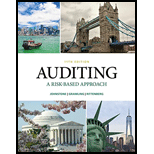
a.
Introduction: The reliability of audit evidence depends upon the origin and the nature of the evidence. The circumstances are forms an important part in deciding about the reliability.
To establish : The difference between reliability and relevance.
b)
Introduction: The reliability of audit evidence depends upon the origin and the nature of the evidence. The circumstances are forms an important part in deciding about the reliability.
To establish: The reliability of potential audit evidence by an auditor.
c)
Introduction: The reliability of audit evidence depends upon the origin and the nature of the evidence. The circumstances are forms an important part in deciding about the reliability.
To establish: Whether the auditor has made a wrong judgment.
Trending nowThis is a popular solution!

Chapter 6 Solutions
Auditing: A Risk Based-Approach (MindTap Course List)
- General accountingarrow_forwardTechNova Inc. is starting a new project expected to generate $1,200,000 in revenues, $400,000 in cash operating expenses, and depreciation expense of $200,000 per year for 8 years. The corporate tax rate is 30%. The project will require an increase in net working capital of $100,000 in year one and a decrease in net working capital of $90,000 in year eight. What is the free cash flow from the project in year one? A) $520,000 B) $530,000 C) $540,000 D) $550,000arrow_forwardDon't use ai given answer and general accountingarrow_forward
 Auditing: A Risk Based-Approach (MindTap Course L...AccountingISBN:9781337619455Author:Karla M Johnstone, Audrey A. Gramling, Larry E. RittenbergPublisher:Cengage Learning
Auditing: A Risk Based-Approach (MindTap Course L...AccountingISBN:9781337619455Author:Karla M Johnstone, Audrey A. Gramling, Larry E. RittenbergPublisher:Cengage Learning Auditing: A Risk Based-Approach to Conducting a Q...AccountingISBN:9781305080577Author:Karla M Johnstone, Audrey A. Gramling, Larry E. RittenbergPublisher:South-Western College Pub
Auditing: A Risk Based-Approach to Conducting a Q...AccountingISBN:9781305080577Author:Karla M Johnstone, Audrey A. Gramling, Larry E. RittenbergPublisher:South-Western College Pub- Business/Professional Ethics Directors/Executives...AccountingISBN:9781337485913Author:BROOKSPublisher:Cengage



